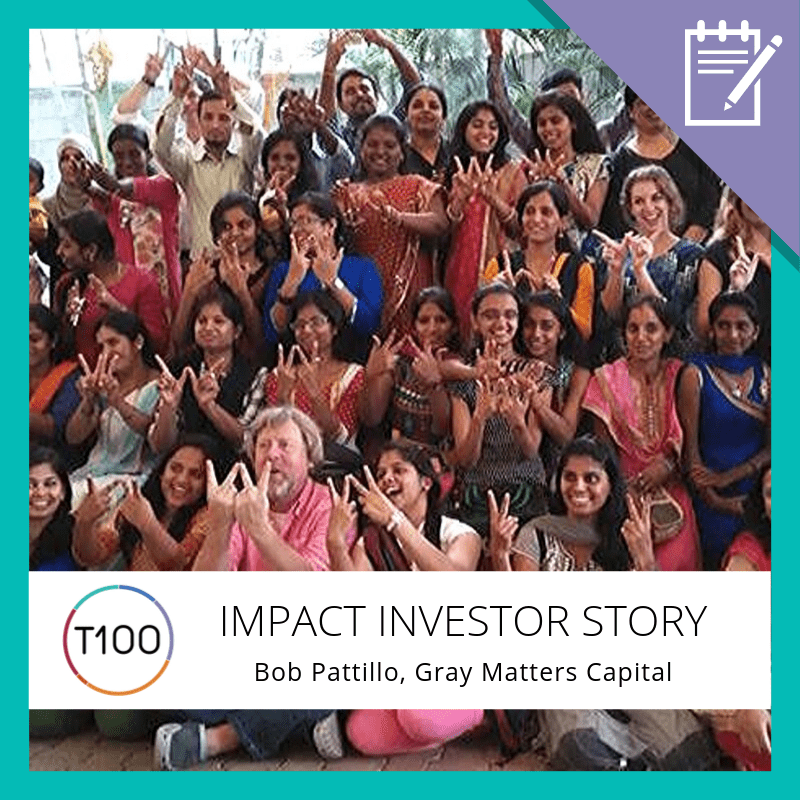Bob Pattillo
Founder, Gray Matters Capital
Hearty and generous, Bob Pattillo is a real Southerner. The 8th generation-Atlanta born founder of Gray Matters Capital is the product of strong family values. His grandfather was a sharecropper. His father went to a one-room rural school, but then to college, thanks to a local businessman who had seen his potential. When he got a job, he went back to his benefactor, ready to give the money back. “But the businessman said ‘Don’t pay me pay back, send someone else to college.’ And my father sent over 2,000 people to college!” tells Pattillo. For the family, it was the beginning of a long stand to defy conventions and social determinism.
Growing up at a time where segregation was still the norm in the South, 55-year old Pattillo remembers how his grandfather, who had finally managed to attend evening school to learn carpentry and start a construction business, had black and white employees working side by side. “It was very, very rare in those days,” Pattillo muses. His grandfather would make sure that in between commissioned construction work – building post-offices and schools for the government – he would keep his employees busy with his own projects, using material that would have been otherwise wasted. “It was to keep them busy and pay them, but also to have a good crew ready for the next big job,” explains Pattillo. He is quick to draw a parallel with impact investing.
When people talk of a trade-off between social entrepreneurship goals and financial returns, in fact, there is no trade off, you can do the right thing, care for people and still have financial gains,
he points out. In fact, they converge: “Human capital is much more important than financial capital,” he concludes.
LAUNCHING A BUSINESS AND A FOUNDATION
As a youngster, Pattillo went to public high school, then to Dartmouth College in New Hampshire. Initially, to please his father, he studied engineering, then business. Restless in Mobile, the young professional soon quit to work for his father in Atlanta. “I was first a salesman and quickly replaced a manager who had left. I was inexperienced but wanted to change things, and made a lot of mistakes. After a few years, my sister called me to tell me I was fired,” he roars with laughter. In 1994, bent on outdoing his father and siblings, Pattillo started his own business, based on the knowledge of the real estate market he had learned from his customers. His company quickly went national and became one of the largest commercial developers in the United States. Pattillo could have been satisfied with his financial success. However, though his relationship with his family was strained, he kept its social and spiritual values. In fact, the same day he registered his business, he launched a foundation. “But the foundation work was done with an old-school philosophy,” he confides. “I had a lot to learn.”
ENLIGHTENED WITH MICROFINANCE
“In 1998, at a Wealth with Responsibility conference, I met Steven Rockefeller – shooting pool, in fact,” he recalls. He asked his new banker friend what he was working on that gave him joy. “He put his cue down and said ‘micro-finance’.” Rockefeller then proceeded to educate Pattillo on the topic. The young entrepreneur, who now happily confesses that he only understood part of what his new friend was saying, was nevertheless instantaneously convinced. Steven Rockefeller hooked him up with Asad Mahmood, who ran a small 3 million-dollar microfinance fund. The repayment rate was very high. Pattillo was so impressed that he decided to check out the microfinance operations on the ground. “Quite frankly, I was looking for the hidden subsidy,” he now confesses.

He set out on a micro-finance journey that took him to countries such as Jordan, Egypt, Bangladesh, and India. Pattillo was hooked. “We helped with start a network called Sanabel (which means ‘sheave of wheat’ in Arabic),” he says. “At that time, there were nine micro-finance banks with a total of 175,000 clients in the Arab world, and six years later, there were 54 microfinance banks and 3 million clients, mostly women. It was quite amazing.”
But by 2002, Pattillo was more and more torn between his growing real estate business and his foundation’s growing microfinance investments in 40 countries. Though he had three young children at home, he was traveling most of the time. “I felt I had to choose,” he says. “I was close to choosing real estate.” But, then by chance he met a new parishioner in church who asked him what he was doing. His 11-year old daughter chimed in, saying her father was in microfinance, “making small hand-shake loans, mostly to women in emerging markets and the repayment rates are quite good,” she explained. Her father still marvels at the anecdote. His feelings were reinforced when he realized that when his family would share the ups and downs of the day at the dinner table, his microfinance stories were always uplifting.
“It was feeding my soul,” Pattillo concludes.
MICROFINANCE AS AN INVESTMENT
Pattillo sold his company and put all the proceeds in the foundation. People around him, including some members of his family, thought he was crazy. “They thought microfinance was charity and would never be repaid!” he explains. At that time, in fact, he was just happy to get the money back, so he could do it again. He started, however, to explore microfinance as an investment.

Gray Ghost Microfinance Fund was launched in late 2003 as a private fund of funds intended to promote the microfinance industry and private capital flows into the industry. It was soon followed by Gray Ventures for impact investing. In 2006, Pattillo started Gray Matters Capital Foundation for social investing, and in 2008, he invested in various funds such as the GGV-Doen Fund, Village Capital, the Indian School Finance Company and IDEX Fellowships. Over the years, his activities have helped close to two million children through school. His next target is women.
The Southerner wants to use the foundation’s 180 million-dollar portfolio to provide an education and consequently a job to 100 million women worldwide by 2026. “It is my calling. It is a spiritual experience, and it has helped me to be a better father,” Pattillo confides. When his children were young, he would take them to places like Mexico and Morocco to see the power of the human spirit in a desperate environment. And you know what? Today his children have become social entrepreneurs.

